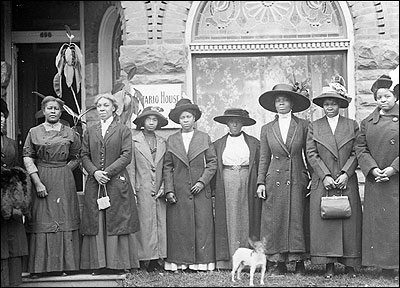This year, Hidden Histories Society Yukon invited Jillian Christmas, a Black Canadian spoken word poet, to Whitehorse at the beginning of February and commissioned her to write a poem in celebration of the diverse Black community in Yukon. The following is an excerpt from her poem Northern Light.
And what strange things are we/ Creatures of the Diaspora/ treasures of the Caribbean Sea/ Knocking our knees together in parkas/ chattering teeth/ Up where the trees thin and creak/ stretching high the heavens to/ seek the queerest light/ What strange escapes have we made in the night/ to want to call this place home?
Black History Month offers us an opportunity to learn, celebrate and educate each other about the accomplishments and struggles of Black Canadians, and to explore the questions raised by Jillian Christmas’s poem.
It is about sharing individual stories of accomplishment and struggle, of learning about movements, of celebrating and creating. History is so expansive that you’ll never run out of things to learn, new ways to look at a narrative, and ways to celebrate it. There are countless ways to celebrate Black History. We have complied six suggestions based on tools which have been developed by Canadian organizations. I am sure there are many resources I have missed. Please send them to [email protected]
1. Celebrate and empower Black Canadian Women
The theme for Black History Month in Canada, announced by the federal government is “Black Canadian Women: Stories of Strength, Courage and Vision.” When announcing the theme, the federal government statement mentioned Jean Augustine, Viola Desmond, Michaelle Jean, Jully Black, and Afua Cooper as some of the women of African descent who have shaped Canada.
These are great women, but there are so many more women we see around us every day to highlight. One resource to learn about powerful women in our communities is the book, 100 Accomplished Black Canadian Women, which complies profiles of women nominated across the country for their social, educational, political, and professional accomplishments. So far there is a 2016 edition. The 2018 edition will be published soon.
If you would like to get involved in groups working with to strengthen and connect women, one group to contact is the National Congress of Black Women. The Congress of Black Women of Canada was first convened by Kay Livingstone in 1973 and since then has developed a national body in British Columbia and individual chapters across the country. Read about some of their accomplishments in the Rise Up Digital Feminist Archive.
2. Participate in the global recognition of people of African Descent
The Canadian Government has also announced it will officially recognize the UN International Decade for People of African Descent. The decade goes from 2015 to 2024. Find out what is being planned by the United Nations here.
In the United States, the Association for the Study of African American Life and History has chosen “African Americans in Times of War” as the 2018 theme for the United States. Read the description because it is not jingoistic and allows for space to understand all forms of war, from slavery, to the World Wars, to the Black Panthers, through today, underscoring the impact of war on communities. Learn about movements around the world and support the work that people are trying to do in their communities.
3. Seek out exhibitions, readings, and concerts by artists of African descent
The CBC has produced this a cross country guide of arts and culture events being held in Halifax, Montreal, Ottawa, Toronto, Hamilton, Regina, Edmonton, Calgary, Vancouver, Victoria, and Whitehorse during Black History Month. Obviously, the list is not exhaustive, and if you don’t see anything in your community that works for you, do a simple online search and you will find many more events.
If you want an online resource to learn about artists, one of the best is by Black Lives Matter in the United States. Each year, BLM celebrates Black Futures Month in conjunction with Black History Month. Everyday there is an artist uplifted by the network, as well as a written piece that explores an unspoken aspect of the Black reality in America.
4. Explore films by Black Canadian filmmakers
Right now, the new Avengers film Black Panther is packing theatres. However, there are also some smaller festivals from Iqualuit to Toronto which feature Black Canadian filmmakers. There are also films you can watch at home, like the National Film Board playlist of Black Canadian films or you can seek out films by this list from the CBC of African Canadian female filmmakers you need to know.
5. Support the planners of 2019 Black History Months in events in your community
Across Canada, there are communities dedicated to collecting and celebrating the history of Black Canadians. Reach out to them and get involved. These are some of the umbrella organizations. I do not pretend to know all the local organizers of Black History Month in communities across Canada. We would love to broadcast events, however, so reach out and tell us about them.
- British Columbia: BC Black History Awareness Society (BCBHAS)
- New Brunswick: New Brunswick Black History Society
- Nova Scotia: Black Cultural Society of Nova Scotia
- Nunavut: Nunavut Black History Society
- Ontario: Ontario Black History Society
- Prince Edward Island: Black Cultural Society of Prince Edward Island
- Quebec: Mois de l’histoire des noirs and the The Black Coalition of Quebec
- Saskatchewan: Multicultural Council of Saskatchewan
- Yukon: Hidden Histories Society Yukon
6. Support the calls for justice from community activists
Combatting racism in our schools, in our police forces, and in our communities is not something which ends in February. Day in and day out, there are activists organizing in your communities. Reach out to them and support the work they do.
Image: Wikimedia Commons
Like this article? Please chip in to keep stories like these coming.




